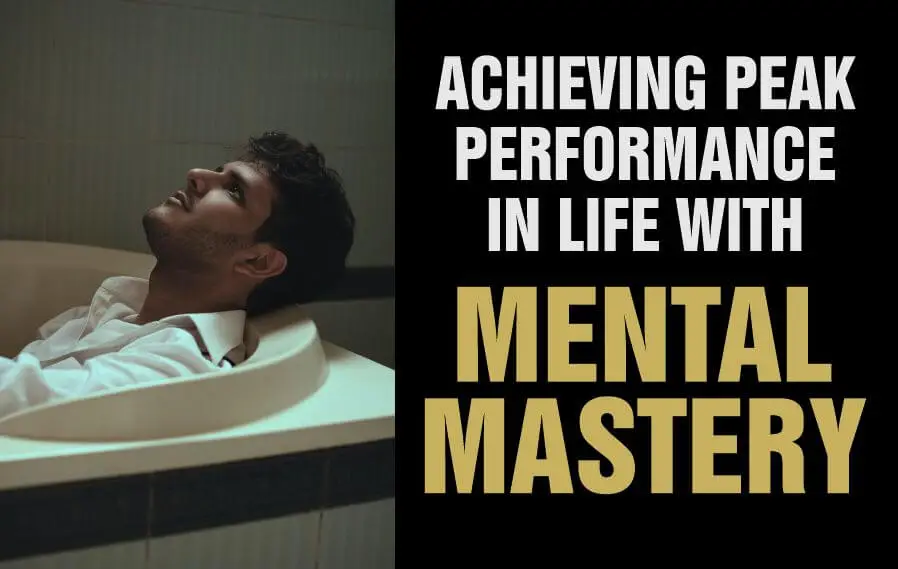Last updated on July 14th, 2024 at 04:39 pm
In this dynamic journey of life mastery and personal growth, mental mastery, also called mind mastery takes center stage.
Not everyone would truly know and understand themselves before they grow old and die as they blunder through life, stabbing around blindly without success.
Developing mind mastery is the stepping stone to life mastery and having a firm grip on your destiny.
Mind mastery goes beyond mere intellectual power; it empowers you to navigate life’s challenges with resilience, embrace a growth mindset, and cultivate enviable self-confidence.
In this article, we are going to discuss what mind mastery is, how to take charge of your mind and change the course of your life for the better.
Table of Contents
- What is Mental/Mind Mastery?
- How Mental Mastery Differs From Mental Strength Or Resilience
- Benefits of Developing Mental and Mind Mastery
- Components of Mental Mastery
- Mental Mastery vs Mental Control
- The Power of The Mind
- How Mind Mastery Can Influence All Areas of Life
- Techniques for Developing Mental Mastery
- Overcoming Mental Challenges
- How to Achieve Peak Performance in Life with Mind Mastery
- Conclusion
What is Mental/Mind Mastery?
Mental mastery or mind mastery is your ability to take full control of your thoughts, emotions, and beliefs, enabling you to navigate life’s challenges with resilience and clarity.
Easier said than done right?
Mastering the mind is a complicated process for the person who is only drifting along life, but to the person who is deliberate and curious about life, mind mastery is easy.
It has to do with cultivating a growth mindset, being emotional literacy, and embracing mindfulness practices.
By understanding the mind-body connection, you can reshape your thought patterns, break free from limiting beliefs, and develop a positive outlook on life.
Related: Integrate Mind and Mental Mastery in Your Daily Routine
Body Mind Mastery
Body-mind mastery is the harmonious integration and optimization of both the physical and mental aspects of your well-being.
It is achieved by the deep understanding and connection between the body and the mind, recognizing how they profoundly influence each other.
By cultivating physical wellness through regular exercise, proper nutrition, and restful sleep, the mind gains clarity and vitality.
Simultaneously, nurturing mental health through mindfulness, meditation, and positive psychology enhances the body’s resilience and overall vitality.
This holistic approach empowers you to achieve peak performance in various aspects of life.
Also, body-mind mastery enables you to harness your mental focus, emotional stability, and physical strength, leading to improved productivity, better relationships, and a heightened sense of fulfillment.
By embracing this connection between body and mind, you can experience heightened well-being and a more balanced, purposeful life.

How Mental Mastery Differs From Mental Strength Or Resilience
While mental strength and resilience are important qualities, they differ from mental mastery in important ways.
Mental strength is the ability to endure and persevere through difficult circumstances and challenges.
It involves having a strong mindset, determination, and the capacity to bounce back from setbacks.
Mental resilience specifically focuses on the ability to adapt and recover from adversity, retaining mental well-being.
On the other hand, mental mastery goes beyond simply coping with challenges; it involves actively shaping one’s thoughts, emotions, and behaviours in a deliberate and intentional manner.
Mind mastery empowers you to have full control over your mental states, to focus on positive thinking, and to proactively direct your actions towards desired goals.
It is about training the mind to operate independently and at its optimal level consistently, rather than only responding to adversity when it arises.
Benefits of Developing Mental and Mind Mastery
1. Improved focus: Mind mastery allows individuals to maintain a clear and focused mind, enabling them to concentrate on tasks and goals without distractions.
2. Enhanced decision-making skills: By gaining control over your thoughts and emotions, mind mastery facilitates better decision-making abilities as you can evaluate situations objectively without being swayed by negative emotions.
3. Increased self-confidence: Developing mind mastery boosts your self-confidence as you master your fears, overcome challenges, and develop a positive outlook on yourself and abilities.
4. Effective stress management: It equips you with strategies to manage stress and adversity effectively, enabling you to maintain mental well-being even in challenging situations.
5. Greater overall well-being: When you have control over your mental states and behaviours, you experience improved overall well-being, leading to higher levels of happiness, contentment, and fulfillment in life.
Components of Mental Mastery

Self-awareness
Self-awareness is the ability to recognize and understand your own thoughts, emotions, and reactions.
It involves being conscious of your inner experiences and having a clear perception of one’s strengths, weaknesses, values, and beliefs.
Mindfulness and meditation play a significant role in self-awareness. By practicing mindfulness, individuals can observe their thoughts and emotions without being overwhelmed by them.
Mindfulness meditation helps cultivate attention and awareness, leading to a deeper understanding of oneself and one’s experiences.
Emotional Regulations
Emotional regulation involves effectively managing and controlling emotions, allowing you to respond to situations in a balanced and constructive manner.
It includes recognizing and understanding emotions, as well as implementing strategies to regulate them appropriately.
Cognitive Restructuring
Cognitive restructuring is the process of changing negative thought patterns and beliefs that contribute to emotional distress and unhealthy behaviors.
It involves identifying and challenging irrational or limiting beliefs and replacing them with more balanced and rational thoughts.
Here are ways to achieve that:
Thought monitoring: Paying attention to automatic thoughts and identifying negative or distorted thinking patterns.
Reality testing: Examining the evidence supporting or contradicting negative beliefs.
Cognitive distortions: Recognizing and challenging cognitive distortions such as all-or-nothing thinking, catastrophizing, or jumping to conclusions.
Therapy Techniques for Cognitive Restructuring
Cognitive reframing: Reframing negative thoughts by looking at a situation from different perspectives or challenging underlying assumptions.
Socratic questioning: Asking oneself guided questions to explore the validity and rationality of negative beliefs.
Behavioral experiments: Engaging in real-life experiments to test the accuracy or helpfulness of negative beliefs.
Mental Mastery vs Mental Control
Mind mastery and mental control are sometimes interchanged, but they are two different terms used to describe two situations.
Mind mastery as described in the above definition goes beyond controlling and harmonizing the mind.
It involves cultivating a deeper awareness of yourself, and deploying emotional intelligence and resilience in navigating life’s challenges.
It empowers you to transform your mindset, beliefs, and responses, leading to sustained personal growth and self-empowerment.
Mental control on the other hand focuses on exerting direct influence over your thoughts and emotions, mostly by suppression and regulation.
It aims to manage immediate reactions and maintain a sense of stability.
While mental control addresses momentary states, mental mastery encompasses a profound and holistic transformation of the mind towards life mastery.
The Power of The Mind
The mind is an awe-inspiring phenomenon that continues to baffle and inspire humanity.
It serves as the command center of your being, influencing every area of your life.
From thoughts and emotions to decision-making and problem-solving, the mind shapes your reality and drives your actions.
One of the most remarkable aspects of the mind’s power is its plasticity.
The brain can adapt and rewire itself based on experiences, learning, and even trauma.
This neuroplasticity allows you to learn new skills, form habits, and recover from injuries, showcasing the mind’s incredible potential for growth and healing.
The mind’s power also lies in its ability to shape your perceptions of the world.
The same external circumstances can be interpreted differently by different individuals, based on their mindset and beliefs.
This emphasizes the importance of cultivating a positive and open mindset to navigate life’s challenges with resilience and optimism.
How Mind Mastery Can Influence All Areas of Life

Yes! I describe mental mastery as the determining factor of the direction we go in life.
By cultivating a deep understanding of your thoughts, emotions, and beliefs, you can develop a resilient and growth-oriented mindset that determines where you end up in life.
This mindset, in turn, impacts decision-making, problem-solving, and overall behaviour.
In personal relationships, we see mental mastery play out by promoting emotional intelligence, enabling you to empathize, communicate effectively, and build stronger connections.
It empowers you to manage conflicts constructively and respond to challenges with composure.
In professional pursuits, mind mastery enhances focus, productivity, and creativity by enabling you to set ambitious goals, persist in the face of setbacks, and maintain a positive outlook.
Furthermore, mental mastery plays a pivotal role in physical well-being.
Reducing stress and anxiety bolsters the immune system and promotes better health outcomes.
Techniques for Developing Mental Mastery
There are several techniques you can employ to develop mind mastery. For easy understanding, we have divided them into three sections including self-awareness and self-reflection, setting and achieving goals, and building resilience and emotional intelligence.
1. Self-awareness and Self-reflection
Self-awareness or self-knowledge is the conscious recognition of one’s thoughts and emotions without judgment.
Self-awareness and self-reflection are powerful techniques that contribute to the development of mind mastery, empowering individuals to understand their thoughts and emotions, recognize negative patterns and triggers, and embrace mindfulness and meditation for inner growth and resilience.
Let’s break them down:
Understanding Thoughts and Emotions: Thoughts and emotions shape your personality and character. Understanding them involves awareness of your mental and emotional experiences, recognizing thoughts and interpreting feelings. Developing this awareness enables self-regulation and clarity in responding to situations. Some people are naturally skilled at discerning negative thoughts and emotions while others fail at it, but it can be developed. Being competent in self-awareness grants control over this area of mental capacity, allowing deliberate influence.
Recognizing Negative Patterns and Triggers: Self-reflection allows you to identify negative patterns and triggers that impact your well-being. By honestly analyzing past experiences and reactions, you can recognize these patterns, anticipate triggers, and choose healthier responses, avoiding self-destructive behaviours and adopting better-coping mechanisms.
Practicing Mindfulness and Meditation: Mindfulness and meditation are crucial for mental mastery. They involve being present, and observing thoughts and emotions without attachment. Regular practice enhances clarity, focus, and emotional regulation, reducing stress. Meditation deepens self-awareness, connecting mind and body. It promotes relaxation, inner peace, and a compassionate, non-judgmental relationship with oneself.
2. Setting and Achieving Goals
Setting and achieving goals is key to mental mastery. It involves consciously determining what one wants and taking action.
Clear planning and focused effort are necessary. It requires mental focus, resilience, and commitment, fostering a strong and disciplined mindset.
Developing a Growth Mindset: Approaching goals with a growth mindset is crucial. It believes abilities can be developed through dedication and hard work. It embraces challenges, persists, and learns from failures. A growth mindset sees setbacks as opportunities for growth, enhancing mental flexibility and adaptability.
Cultivating Discipline and Willpower: Setting and achieving goals necessitates discipline and willpower. Discipline involves self-control and consistent effort despite distractions. Willpower is resisting short-term gratification for long-term goals. Practicing discipline and exercising willpower strengthens mental muscles and fosters self-control. This leads to goal attainment and a resilient mindset to overcome challenges.
Creating a Clear Vision and Action Plan: Setting and achieving goals requires a clear vision and SMART goals. Visualizing the desired outcome enhances motivation and focus. Developing a detailed action plan provides a roadmap for success. Breaking down the goal into manageable tasks allows for effective organization and progress measurement, fostering mental mastery.
3. Building Resilience and Emotional Intelligence
Building resilience and emotional intelligence are crucial for developing mental mastery, as they allow you to navigate challenges and setbacks with a greater sense of well-being and efficacy.
These two skills go hand in hand, as resilience helps you bounce back from adversity and emotional intelligence enables you to understand and manage your own emotions as well as effectively connect with others.
Coping with Stress and Adversity: Resilience is the ability to cope with stress and overcome adversity. It enables you to handle difficult situations, bounce back from setbacks, and maintain mental well-being. Resilient individuals have a positive mindset, see challenges as growth opportunities, and possess effective problem-solving skills, staying focused on their goals despite stress and adversity.
Enhancing Self-control and Emotional Regulation: Emotional intelligence involves self-awareness and effective emotion management. Recognizing, understanding, and regulating emotions signifies emotional intelligence. Self-control is crucial for mental mastery, enabling rational decision-making over emotional impulses. It also promotes calm and composed responses, reducing impulsivity and enhancing mental clarity.
Practicing Empathy and Effective Communication: Emotional intelligence includes understanding and empathizing with others. Empathy encourages better relationships and communication. Developing empathy improves collaboration, teamwork, and social competence. Effective communication involves expressing thoughts, needs, and emotions assertively while actively listening to others.

Overcoming Mental Challenges
Mental challenges are obstacles that can hinder your ability to achieve mental mastery.
Overcoming these challenges is crucial in attaining mastery of the mind, as it allows you to develop resilience, confidence, and a positive mindset.
1. Self-doubt
One common mental challenge is self-doubt and limiting beliefs, which are negative thoughts or beliefs about oneself that can inhibit personal growth and success.
Overcoming self-doubt has to do with challenging the validity of the beliefs and masking them with positive beliefs.
This can be done by questioning the evidence supporting these beliefs and seeking counter-evidence that contradicts them.
Additionally, recognizing that self-doubt is a normal part of the human experience can help in reducing its impact.
Challenging Negative Self-talk: Overcoming mental challenges involves countering negative self-talk. Replace detrimental thoughts with positive ones by monitoring and disputing them, fostering personal growth and mental mastery for improved well-being.
Affirmation and Positive Self-perception: Use affirmations to shape a positive self-perception and overcome mental challenges. Repeating positive statements cultivates confidence and reinforces belief in one’s abilities.
Seeking Support from Mentors or Therapists: Achieving mental mastery involves seeking guidance from mentors for advice and a fresh perspective. Therapists provide professional support, offering a confidential space for self-exploration and growth.
2. Managing Fear and Anxiety
Managing fear and anxiety is crucial for overcoming mental challenges and achieving mental mastery.
It involves understanding fear and its role, developing coping strategies, and using gradual exposure and desensitization techniques.
Let’s take a deeper look…
Understanding Fear and its Role: Fear is a natural response to threats, activating fight-or-flight. However, irrational fear can be debilitating. Understanding and managing fear is crucial for emotional well-being.
Developing Coping Strategies: Coping strategies manage fear and anxiety through psychological (deep breathing, positive self-talk) and physical (exercise, sleep, diet) techniques, ensuring control and preventing overwhelm.
Gradual Exposure and Desensitization Techniques: Overcoming fears involves gradual exposure and desensitization, starting with less anxiety-inducing situations and progressing to more challenging ones
3. Maintaining Focus and Concentration
Maintaining focus and concentration is crucial for overcoming mental challenges in mental mastery as it allows us to direct our attention towards the task at hand and stay engaged in the present moment.
By eliminating distractions, improving concentration through meditation and mental exercises, and embracing mindfulness in daily activities, we can enhance our ability to overcome mental challenges.
Here are some tips:
Eliminating Distractions: Distractions can hinder your ability to maintain focus and concentration. It is important to identify and eliminate or minimize distractions such as noise, clutter, or unnecessary notifications when attempting to engage in mental mastery. Creating a quiet and organized environment can help us stay focused on the task at hand.
Improving Concentration Through Meditation and Mental Exercises: Meditation and mental exercises boost concentration and mental abilities. Meditation enhances focus, while puzzles and games challenge the brain to stay engaged.
Embracing Mindfulness in Daily Activities: Mindfulness entails full awareness of thoughts and actions in the present. Incorporating it into daily life fosters focus and helps tackle mental challenges directly.
How to Achieve Peak Performance in Life with Mind Mastery

Achieving peak performance in life with mind mastery involves developing and harnessing the power of your mind to optimize your mental, emotional, and physical abilities.
Here are some steps to help you accomplish this:
Set Clear Goals: Begin by clearly defining your goals. Make them specific, measurable, attainable, relevant, and time-bound (SMART). Having clear goals provides a sense of direction and purpose, which helps in channeling your mental energy.
Adopt a Growth Mindset: Embrace a growth mindset that believes abilities and intelligence can be developed through dedication and hard work. Understand that failures and setbacks are opportunities for learning and growth, rather than reasons for giving up. Cultivating a growth mindset enables you to stay motivated and resilient
Cultivate Positive Thinking: Practice positive thinking by focusing on the good, expressing gratitude, and reframing negative thoughts. Positive thinking enhances your mental state, reduces stress, and helps you maintain a positive outlook on life, thereby helping you achieve peak performance.
Practice Mindfulness: Incorporate mindfulness practices into your daily routine. Mindfulness involves paying attention to the present moment without judgment. Engaging in meditation, deep breathing exercises, or simply being fully present in whatever you do can help increase your focus, clarity, and overall mental well-being.
Manage Stress: Develop effective stress management techniques, as stress can hinder peak performance. Find healthy coping mechanisms such as exercise, relaxation techniques, or engaging in hobbies to reduce stress levels. Taking care of your physical and mental well-being is essential for achieving peak performance.
Enhance Concentration and Focus: Train your mind to improve concentration and focus. Eliminate distractions, create a conducive environment for work or practice, and practice techniques such as single-tasking to enhance your ability to concentrate on the task at hand.
Develop Resilience: Build resilience by embracing challenges, learning from failures, and adapting to setbacks. Resilience allows you to bounce back from obstacles, maintain a positive attitude, and continue striving for peak performance.
Maintain a Balanced Lifestyle: Pay attention to maintaining a balanced lifestyle. Ensure you get enough sleep, eat a healthy diet, engage in regular physical activity, and incorporate periods of relaxation and leisure. A balanced lifestyle supports optimal mental and physical well-being, providing a solid foundation for peak performance.
Continuous Learning: Commit to lifelong learning and personal development. Stay curious, seek new knowledge, and acquire new skills. Embrace the mindset of constantly growing and evolving to unlock your full potential.
Surround Yourself with Positivity: Surround yourself with individuals who support and inspire you. Create a positive and supportive environment that encourages personal growth and nurtures your ambitions. The people you surround yourself with can significantly impact your mindset and overall performance.
Conclusion
Peak performance in life hinges on mental mastery, achieved through self-awareness, emotion management, and a positive mindset.
This mastery encourages focus, motivation, and resilience in facing challenges. It enhances productivity, creativity, and decision-making by enabling meaningful goal-setting and effective strategies.
Prioritizing mental well-being and investing in mind mastery practices lead to thriving and reaching peak success across life domains, creating a holistic and fulfilling life.
Pious Clements is the insightful voice behind "The Conducts of Life" blog, where he writes about life ethics, self-development, life mastery, and the dynamics of people and society.
With a profound understanding of human behaviuor and societal dynamics, Pious offers thought-provoking perspectives on ethical living and personal growth.
Through engaging narratives and astute observations, he inspires readers to navigate life's complexities with wisdom and integrity, encouraging a deeper understanding of the human experience and our place within society.

